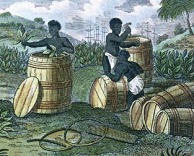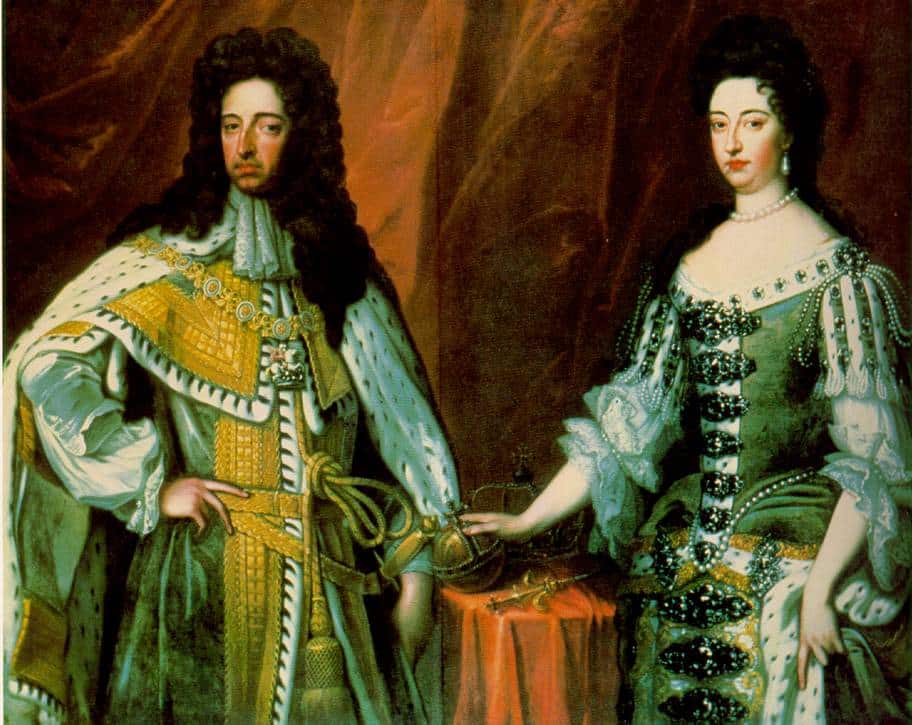King James I
The British slave trade started to become a major enterprise in the 17th century, when King James I set up the first monopoly company to trade with Africa in 1618. Britain acquired colonies in America and the Caribbean and demand for slaves to work the tobacco, rice, sugar and other crops on plantations grew. London was the centre of this early trade. In 1698 the monopoly on trade with Africa was abolished, opening up the valuable opportunity to merchants from other ports such as Bristol and Liverpool. Wealth from the direct trade in slaves and from the plantations came back to Britain and was invested in buildings which stand today. (source: English Heritage)

The Royal African Company - Supplying Slaves to Jamestown
The Start of English Slave Trade -- As early as 1618, King James I had granted a patent to a company that wanted to trade for gold and precious woods in Africa. Other groups also received rights to trade in Africa, but never dealt with slaves in any major way. English involvement in the slave trade would intensify after 1663, when a new patent was issued to the Company of Royal Adventurers. England had realized the money to be made trading slaves to the West Indies and Virginia. By 1668, over a quarter of the new company’s profits was derived from the slave trade.

Africans in Virginia’s Early Years -- The first documented arrival of Africans to Virginia was in 1619, when a Dutch trading vessel docked near present-day Hampton. Aboard were about 20 Africans who were traded to the English as much-needed workers to cultivate tobacco, the new cash crop of Virginia. The institution of slavery slowly crept into Virginia legislation. By 1660, slavery as we think of it today was established in Virginia. Tobacco was extremely labor-intensive, and more and more workers were needed. The sale of Africans to Virginia planters promised to be a profitable endeavor.

An Official of the Guinea (Royal African Company) Treaty Making in 1672
The Company’s Beginnings -- At first, trading directly with other European countries was common in Virginia. But the Navigation Act of 1660 brought such relations to a close. Only English-owned ships could enter colonial ports. The Crown had realized the wealth that could be achieved through trade and wanted that wealth for England. Once the Navigation Act was passed, Virginia planters were forced to rely on the Mother Country to supply them with their labor force. To address this dearth, the Royal African Company was formed in 1672.

Agents in Jamestown -- Merchants in London associated with residents of Jamestown were also heavily involved in the slave trade. John Jeffreys, one of these merchants, owned part of a rowhouse in New Towne, and historians speculate that slaves were sold in front of the building on a wharf. The Royal African Company also had agents in Virginia to whom slaves were delivered. These agents received a seven-percent commission on sales. John Page, Colonel Nathaniel Bacon and William Sherwood were all prominent Virginians who served as factors, agents or representatives for the Company.

James II is overthrown, and William and Mary take the throne as joint rulers
The Company’s Decline -- Many factors contributed to the loss of the Royal African Company’s monopoly in 1689. First and foremost, the Company was not achieving a profit; as a matter of fact, it resorted to borrowing money to pay dividends. Then there were the complaints from the planters. The demand for slaves was always too high for the Company alone to supply, and the planters urged that the monopoly be abolished so that more slaves could be imported. Finally, the Company, which was always heavily patronized by the Stuart monarchs, fell out of favor when James II was deposed and William and Mary came to the throne. (source: National Park Service)

No comments:
Post a Comment